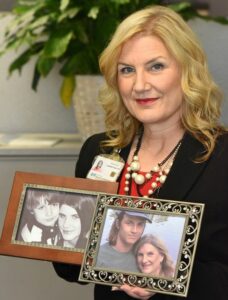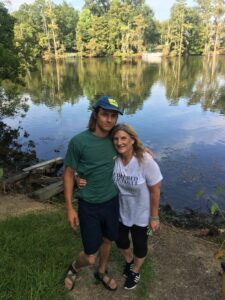Opioid Crisis: A Mother’s Pain Leads to Advocacy
Paula Cunningham, manager of Medical Policy Administration for Arkansas Blue Cross and Blue Shield
Editor’s note: Paula Cunningham, the manager of Medical Policy Administration for Arkansas Blue Cross and Blue Shield, has been tragically affected by Arkansas’ opioid crisis, which claimed the life of her son, Parker. Since her son’s passing in 2018, Cunningham has become a passionate activist, seeking a pragmatic approach in addressing the problem and encouraging compassion for those whose lives are touched by it. This article is her very personal account.
Paula’s story gives a voice to the opioid crisis
My story

On August 29, 2018, I sat at my son’s bedside and looked at his sweet face, remembering the child he once was; imagining his laughter and sweet smile that would fill and light up the room. I remembered the big hugs he gave. I watched as the machine moved his chest up and down rhythmically, lulling me back to the memories of the days when he would run through the house with excitement over just about anything. I remembered the tender, loving heart underneath that big laugh. I remembered the son who hated to see me cry and hated it more when he was the reason I cried. So, I held back the tears, and I thanked God for this beautiful child.
I held my son’s hand that night for the last time. I watched as his heartbeat grew weaker and weaker. Surprisingly, that wasn’t the hard part. The hard part was the past four years, watching a disease consume my child. Watching a drug turn my son into a machine that functioned only to replace the drug that was keeping it running. Watching him so desperately try to fight it on his own – trying to save his family the pain it caused. Watching him die inside over the shame people heaped on him.
My son, Parker, suffered from opioid use disorder. The pain of watching him lie helpless as the machine kept him breathing was no more severe than watching him live with and fight the disease. He didn’t want it any more than someone who wants cancer or another serious chronic illness. I remember a head hung low with tears of shame and guilt after a relapse.
Yet he got back up and returned to treatment to try again. I remember every cry of “I’m sorry” after another unkept promise. I remember his great efforts to try to hide the magnitude of his addiction from his family. I remember his despair over a disease he couldn’t control. And finally, I remember his fear. I didn’t see a young man with a drug addiction. I saw a scared child desperate to find a way to beat this monster of a disease so that he could live. I saw my beautiful, sweet, quick-witted, loving child trying to hide the pain and fear of a realization that he might not make it.
At some point in his early teens, Parker chose to take an opiate that someone gave him. Shortly after, it was no longer a choice for him. It wasn’t as simple as just deciding to quit. Parker couldn’t quit on his own, no matter how hard he tried. That’s hard for some to understand. This lack of understanding leads to a stigma attached to people with substance use disorder. This stigma is a mark of disgrace, shame or judgment that is placed on someone when we perceive that he or she is somehow at fault for an illness or lacks the will or desire to overcome it. This belief – that the person suffering from an opioid use disorder can control it or is to blame – is wrong.
Family faces opioid stigma and blame too
This stigma is also difficult for the family. I needed to talk about my son’s illness, but many people aren’t comfortable talking about addiction. Facing the fact that your child or loved one has a serious chronic illness is tough enough without the added stigma and blame that often get placed on family members.
To counteract the stigma and wrap my head around the seriousness of my son’s illness, I approached it as if Parker had cancer. I knew many parents faced life knowing that their child was suffering from cancer or some other serious illnesses and that those parents somehow managed. Therefore, in my mind, I approached it as if my son had been diagnosed with cancer. How would I handle it if he were battling cancer? I would fight alongside my child as hard as I could. If he wanted to fight and wanted treatment, I would help him get that treatment and support him every step of the way.
Standing strong for Parker as he battled opioid use disease

Parker didn’t want this disease any more than anyone else fighting a serious, chronic illness wants to stay ill. I remember sitting with him while he cried, telling me he just wanted to be normal – to be the son, brother, uncle and grandson that his family deserved. I saw Parker trying his best to fight, so I was determined to stand strong and fight alongside him. After battling hard through several different modes of treatment, including residential treatment, intensive outpatient treatment and medication-assisted treatment, my son lost the fight, following an accidental overdose at just 20 years of age.
It has not been an easy journey – and certainly not one that I chose. However, it’s what I have been given. I wish I could sit back and pretend all of this isn’t happening. I wish I could simply ignore the crisis that is going on in our state and in our country. But I can’t. There simply is too much work to be done. I don’t believe that any of us can afford to turn a blind eye to this epidemic. It’s going to take all of us coming together to do what we can in our own circles of influence to end this opioid crisis. My plea to anyone reading this is to ask yourself what you can do to make a difference.
What can you do?
- Decrease the stigma. The language we use matters. This is the simplest, yet most profound, action we can take. Use language such as, “a person with a substance use disorder” or “a person struggling with addiction” rather than harsher labels such as “addict,” “drug abuser” or “junkie.” Remember, addiction is not a moral failing but a chronic disease. Research has shown that addictive substances can lead to changes in brain function and decrease a person’s ability to control their substance use. Repeated use significantly alters the brain’s chemistry and circuitry, thereby creating a neurobiological disorder.
- Monitor, secure and dispose of prescription medications. Often people who abuse opioids get them from the medicine cabinets of family members or friends. It’s essential that we lock up opioid medications and dispose of any leftover pills. Arkansas has prescription drug take-back events twice a year throughout the state, during which unused medications may be dropped off for safe disposal. Additional permanent disposal sites are located throughout the state at various locations.
- Have lifesaving naloxone (Narcan) on hand if you feel you might be in a position to intervene in an opioid-related overdose. Naloxone is an opioid antagonist that can be used to reverse the effects of an opioid-induced overdose. It is available for purchase with a prescription at some pharmacies in Arkansas. Naloxone purchased with a prescription is covered by Arkansas Blue Cross.
- Seek help. Whether it is you or your family member struggling with a substance use disorder, know that you are not alone and that help is available. There are several different treatments available, including residential treatment, partial hospitalization, intensive outpatient treatment and medication-assisted treatment. Medication-assisted treatments (e.g., methadone, buprenorphine, naltrexone), combined with counseling and behavioral therapy, have been proven to reduce the rate of overdose in people who have an opioid use disorder. A variety of “12-step” programs (Alcoholics Anonymous, Narcotics Anonymous and the faith-based Celebrate Recovery program) and other self-help options complement treatment of opioid use disorder. Al-Anon is a 12-step program designed to help family members of people struggling with substance use disorders.
- Advocacy and change. We all have an opportunity, in our own circles of influence, to make a difference. Assess needed change in your workplace, church, social settings, civic groups or professional affiliations. Ask yourself if you can do something to influence change. For example, if you work in a health-related field, are you advocating for medication-assisted treatment? If you are a member of a civic group, could you suggest a speaker to promote education and awareness? Each of us can do something. No action is too small.
This is not just my story. This could be anyone’s story. This is the story of the parents and loved ones of the other 47,000 victims of opioid-induced overdose in 2017 and the countless others who were lost in 2018 and so far in 2019. The disease of addiction knows no boundaries. It affects both males and females across age groups, races, religions and social statuses. The very real flesh-and-blood people struggling with substance use disorder are our neighbors, our friends, our co-workers, our family members and perhaps ourselves.
Need help?
If you or someone that you care about is dealing with opioid-use or substance-use disorder, please reach out and seek treatment. Find help by contacting the national drug addiction helpline (24/7/365) at 1-800-644-HELP (4357) or the Arkansas Mental Health & Addiction Support Line at 1-844-763-0198.